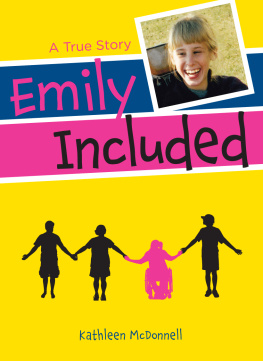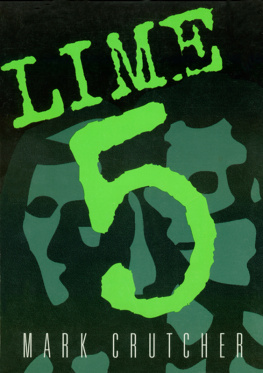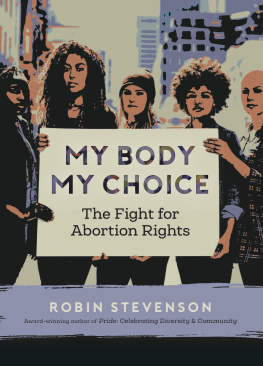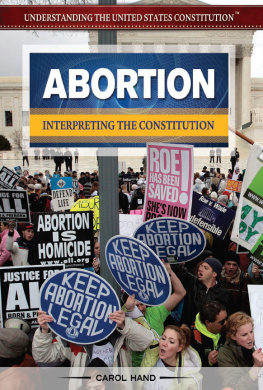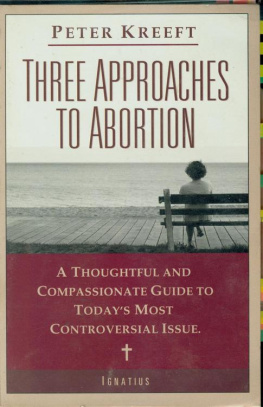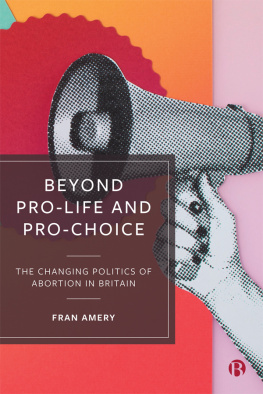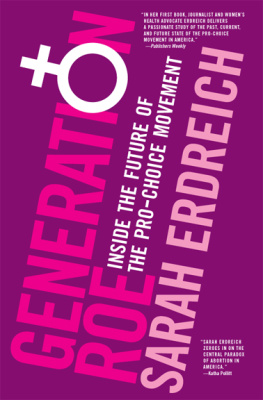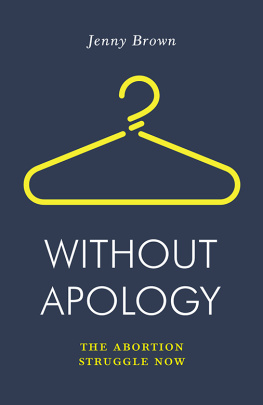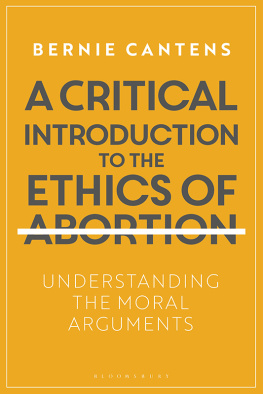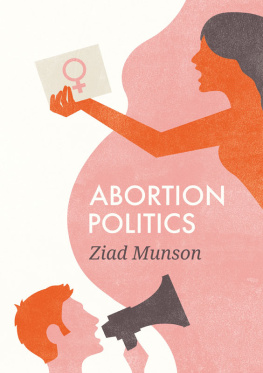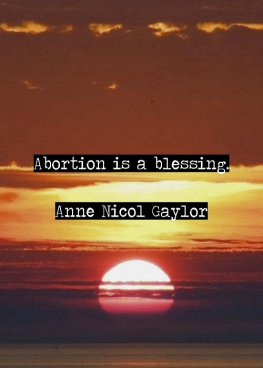NOT AN EASY CHOICE
NOT AN EASY CHOICE
RE-EXAMINING ABORTION
Kathleen McDonnell

NATIONAL LIBRARY OF CANADA CATALOGUING IN PUBLICATION DATA
McDonnell, Kathleen, 1947
Not an easy choice: re-examining abortion / Kathleen McDonnell. -- Rev. ed.
ISBN 1-896764-65-7
1. Abortion. 2. Abortion--Moral and ethical aspects.
3. Abortion--Psychological aspects. I. Title.
HQ767.M42 2003 363.46 C2002-904274-7
This edition 2003 by Kathleen McDonnell
First published in 1984 by the Womens Press
Cover art by Lee Rapp
Text design by Liz Martin
Edited by Jane Springer
Indexed by Kate Forster
Assembly by Sharon Nelson and Irit Shimrat
Printed and bound in Canada
Second Story Press gratefully acknowledges the support of the Ontario Arts Council and the Canada Council for the Arts for our publishing program. We acknowledge the financial support of the Government of Canada through the Book Publishing Industry Development Program, and the Government of Ontario through the Ontario Media Development Corporations Ontario Book Initiative.

Published by
SECOND STORY PRESS
720 Bathurst Street, Suite 301
Toronto, ON
M5S 2R4
www.secondstorypress.on.ca
Visit the authors web site: www.kathleenmcdonnell.com
CREDITS
Grateful acknowledgment for excerpts from:
Abortion and Contraception by Henry Morgentaler 1982. Reprinted by permission of the author and General Publishing Co. Limited, Toronto, Canada.
A Different Voice by Carol Gilligan, Harvard University Press. Copyright 1982 by Carol Gilligan. Reprinted by permission.
Right-Wing Women by Andrea Dworkin, G.P. Putnams Sons. Copyright 1983 by Andrea Dworkin. Reprinted by permission of the author.
Abortion: Some Ethical Issues by Daniel Callahan in Thomas A. Shannon, Ed., Bioethics, rev. ed., The Paulist Press, 1981.
The Future of Motherhood by Jessie Bernard. Copyright 1974 by Jessie Bernard. A Dial Press book. Reprinted by permission of Doubleday & Company, Inc.
The War Against Choice: Inside the Anti-abortion Movement by Deirdre English in Mother Jones, February/March 1981. Reprinted by permission.
Woman on the Edge of Time by Marge Piercy. Copyright 1976 by Marge Piercy. Reprinted by permission of Alfred A. Knopf, Inc.
Seizing the Means of Reproduction by Pauline Bart in Women, Health and Reproduction, ed., Helen Roberts. Reprinted by permission of Routledge and Kegan Paul Ltd.
The Case for Lay Abortion by Connie Clement in Healthsharing, Winter 1983. Reprinted by permission of the author.
Letter from Vicki Van Wagner in Healthsharing, Spring 1984. Reprinted by permission of the author.
The Right to Grieve: Two Women Talk About Their Abortions in Healthsharing, Winter 1983. Reprinted by permission.
Naming Our Experience by Mary OBrien in Healthsharing, Summer 1983. Reprinted by permission of the author.
The Politics of Hysteria: Man, Media and the Test-tube Baby by Mary OBrien in Canadian Womens Studies, Summer 1979. Reprinted by permission of the author.
The Politics of Reproduction by Mary OBrien, Routledge and Kegan Paul. Copyright 1981 by Mary OBrien. Reprinted by permission of the author.
The Real Abortion Issue by Susan Cole in This Magazine, June 1983. Reprinted by permission of the author.
Cracking the Womens Movement Protection Game by Lindsy Van Gelder in Ms, December 1978.
The Ethics of Choice by Rayna Rapp in Ms, April 1984.
For Mary Elizabeth Fitzgerald McDonnell
19061976
CONTENTS
INTRODUCTION
THE ISSUE THAT REFUSES TO GO AWAY
CHAPTER ONE
ABORTION: WHY A RE-EXAMINATION?
CHAPTER TWO
WOMENS EXPERIENCE OF ABORTION
CHAPTER THREE
MORALITY AND ABORTION
CHAPTER FOUR
MEN AND ABORTION
CHAPTER FIVE
CHOICE: PURE AND SIMPLE?
CHAPTER SIX
THE ANTI-ABORTION MOVEMENT
CHAPTER SEVEN
CONTROLLING REPRODUCTION
CHAPTER EIGHT
RECLAIMING ABORTION
PREFACE
to the 2003 edition
WHEN NOT AN EASY CHOICE: A Feminist Re-examines Abortion was first published in 1984, it stirred up a great deal of discussion among feminist activists and the public at large. An exploration of what were, at the time, the unspoken issues in the abortion debate, it pulled together many of the current threads in the discussion and wove in some new ones as well. As such, the book was very much a document of that particular period and point in history. I continued to write and speak on these issues for several years after the book came out, but I came to realize that in writing Not an Easy Choice, I had pretty much said what I had to say about abortion and reproductive rights. As I watched my own two children grow up, the focus of my writing shifted toward them and the world they were growing up in. I began writing childrens plays, young-adult novels and books about kids and the media, all of which I continue to do.
Yet this book has followed me with surprising persistence. For years after it came out, I continued to get letters from readers. They wrote about how much the book meant to them, and frequently expressed the sentiment that in exploring my own mixed feelings about abortion, I had given them the freedom to express theirs. And it wasnt only women I heard from. Not long ago I ran into an acquaintance, a man I hadnt seen in years, who praised the book and thanked me for making a space for men in the discussion of abortion.
Even when the book went out of print toward the end of the nineties, it continued to circulate. I received income through people photocopying parts of it, usually whole chapters for use in courses. In fact, since its publication there hasnt been a year that I havent seen at least some earnings from Not an Easy Choice an almost unheard-of situation for a book published by a small Canadian press. As I write this in early 2003, it seems that people still want to read this book and digest its arguments, and so it makes sense to put it out there once again.
I said in my Preface to the first edition that the personal catalyst for writing Not an Easy Choice was the experience of having a child. That child, my daughter Martha, has herself grown into a woman of child-bearing age, and her younger sister, Ivy, born in 1988, isnt too far behind. This new edition of Not an Easy Choice is particularly for my daughters and their generation, young women and men who never experienced the early struggle for reproductive rights in the sixties and seventies, but who might find it useful to know what we went through. Especially since they might have to fight the battle all over again.
K.M.
PREFACE
THIS BOOK IS the product of a very personal re-examination of my own thinking on abortion over the past several years. At many points in this process, I felt a bit like a feminist heretic, attending pro-choice rallies and marches while secretly harbouring thoughts and feelings that seemed to clash with what I saw as the official line on abortion. Gradually I found myself coming back to a basic feminist truth: that our politics cannot afford to be divorced from our authentic feelings, no matter how vague or contradictory they may seem. Our real task is to search out and find ways to reconcile the two.
Next page

